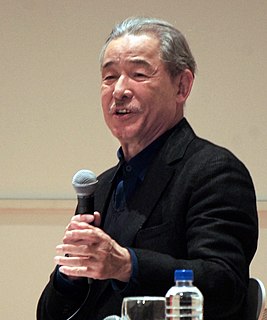A Quote by Orson Welles
Today I believe that man cannot escape his destiny to create whatever it is we make - jazz, a wooden spoon, or graffiti on the wall. All of these are expressions of man's creativity, proof that man has not yet been destroyed by technology. But are we making things for the people of our epoch or repeating what has been done before? And finally, is the question itself important? We must ask ourselves that. The most important thing is always to doubt the importance of the question.
Quote Topics
Always
Ask
Been
Before
Believe
Cannot
Create
Creativity
Destiny
Destroyed
Done
Doubt
Epoch
Escape
Expressions
Finally
For The People
Graffiti
His
I Believe
Importance
Important
Important Thing
Itself
Jazz
Make
Making
Man
Most
Most Important Thing
Must
Our
Ourselves
People
Proof
Question
Repeating
Spoon
Technology
The Most Important
Thing
Things
Today
Wall
Whatever
Wooden
Related Quotes
If our supreme value is the development of the Western tradition - of a man for whom the highest thing in life is man, for whom love for man, respect for man, and the dignity of man, are supreme values - then we cannot ask the question that says, "if it is better for our survival, might we drop these values?"
If abuses are destroyed, man must destroy them. If slaves are freed, man must free them. If new truths are discovered, man must discover them. If the naked are clothed; if the hungry are fed; if justice is done; if labor is rewarded; if superstition is driven from the mind; if the defenseless are protected, and if the right finally triumphs, all must be the work of man. The grand victories of the future must be won by man, and by man alone.
One of man's important mistakes, one which must be remembered, is his illusion in regard to his I. Man such as we know him, the 'man-machine,' the man who cannot 'do,' and with whom and through whom everything 'happens,' cannot have a permanent and single I. His I changes as quickly as his thoughts, feelings and moods, and he makes a profound mistake in considering himself always one and the same person; in reality he is always a different person, not the one he was a moment ago.
I have always been interested in conducting research that yielded new methods by which to make cloth, and in developing new materials that combine craftsmanship and new technology. But the most important thing for me is to show that, ultimately, technology is not the most important tool; it is our brains, our thoughts, our hands, our bodies, which express the most essential things.
The moment the doctrine of the immortality is separately taught, man is already fallen. In the flowing of love, in the adoration of humility, there is no question of continuance. No inspired man ever asks this question, or condescends to these evidences. For the soul is true to itself, and the man in whom it is shed abroad cannot wander from the present, which is infinite, to a future which would be finite.
Many people correctly make the point that our only hope is to turn to God. For example, Charles Lindbergh, who said that in his young manhood he thought "science was more important than either man or God," and that "without a highly developed science modern man lacks the power to survive," . . . went to Germany after the war to see what Allied bombing had done to the Germans, who had been leaders in science. There, he says, "I learned that if his civilization is to continue, modern man must direct the material power of his science by the spiritual truths of his God."
Most people/musicians hear things differently and what might please one might not please another. One man's meat is another man's poison. Don't be afraid to dig, the most important people/musicians in my life always have. If you do decide to dig, don't always expect to come up with a clean face. It's o.k. The most important lessons to me have been learned by trial and error. All I'm trying to say is "try to find yourself," as I have.
If a mathematician wishes to disparage the work of one of his colleagues, say, A, the most effective method he finds for doing this is to ask where the results can be applied. The hard pressed man, with his back against the wall, finally unearths the researches of another mathematician B as the locus of the application of his own results. If next B is plagued with a similar question, he will refer to another mathematician C. After a few steps of this kind we find ourselves referred back to the researches of A, and in this way the chain closes.




































